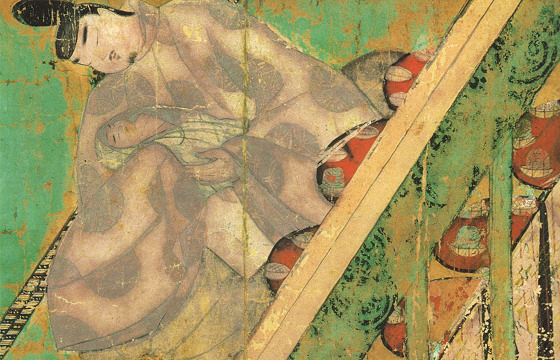The Nose Knows
...which makes it very understandable that smells have long played an important role in Japanese culture.
The Tale of Genji, a Japanese novel written in the 11th century and considered the first novel still regarded as a classic (if not the first real novel, period), often deals with the issue of smells. The Heian Era, when the novel was written and takes place, was long before the Japanese started bathing frequently. Characters are often described as "burning perfume" into their clothes, i.e. imbuing them with incense smoke, and the amount of time and effort spent doing so reflects their psychological state. Moreover, the second part of the novel centers on Genji's son Kaoru (a pun on the word meaning "to give off an aroma") and his friend and bitter rival, Prince Niou (a pun on the word meaning "to smell", actively or passively). The almost too good to be true (in a moral and intellectual sense) Kaoru is described as having an intense but strangely captivating natural body odor which he makes no attempt to hide. Prince Niou, who is handsome but not too bright - and insanely jealous - goes to great lengths to outdo Kaoru by mimicking his style but trying to make it one better...to the point of perfuming himself almost to death. The battle of the smells mirrors the basic premise of that part of the novel; Kaoru does things to the best of his considerable ability, always in a moral manner, but Niou "smells" what his friend is up to and tries to beat him at his own game by crafting an even better "smell"...one that is an immoral deception but winds up winning in the end. (Well, maybe. That's the one thing that really frustrates me about The Tale of Genji: it just stops. Either the ending was lost, or Murasaki Shikibu died before finishing it. At any rate, I would've loved to see Kaoru forget his Buddhist ascetism and beat the shyte out of his even stinkier buddy, but oh well.)

Image from the taleofgenji.org website.
The Tale of Genji takes place in Heian-Kyo, the capital of Japan during the Heian Era (which is why it's called that). Now it is known as Kyoto. Even today, if one visits that fabled city, one smells incense. Lots of incense. And not just in the many temples, either. There's a very good reason for that. Japanese incense is easily among the best in the world if not the best, and for over a thousand years the center of that tradition has been Kyoto. Go to any good incense shop anywhere in Japan (if you can find one; they seem to be disappearing), and it's virtually guaranteed their best wares all say "made in Kyoto". As for Kyoto itself, incense shops are easy to find there, and they have quite a selection. So do the many gift shops. Incense in Kyoto is more than just something you stick in a dish on a family altar or in front of a grave. It's a part of everyday life, and one I've always admired. Indeed, the smell of certain kinds of incense brings back vivid memories of my visits to the ancient Imperial capital and its many treasures.

A selection of Japanese incense offered by Incense on the Way.
I mentioned that incense shops seem to be fading away in areas of Japan outside Kyoto. What has replaced them? It's hard to say, but I have noticed something ironic. The Japanese have been almost obsessed with bathing and cleanliness for at least a couple of centuries, but I found it odd that deodorant was virtually non-existent when I first came here. However, from the late '90s deodorant spray and lotions for both sexes suddenly became all the rage. Coincidentally, this was also the time when actual running sewer lines finally came to be widespread. It used to be that, wherever you went, there was always the sulfurous reek of poorly-sealed cesspools and open sewage ditches in the background. It may be that people's noses used to be more or less numbed by it. Now that the sewage stench has been all but eliminated, people are suddenly taking more note of their own smells. That's why Axe is now part of the modern culture here.
There is also aromatherapy oil. When I first got an oil burner and started using it at home, it was still something of a curiosity here. Now not only the traditional burners, but also sophisticated, self-regulating steamers are widely available and very popular. It is also easy to find a wide selection of essential oils. I'm happy to announce that I (finally) even found and bought a little aromatherapy burner that plugs into the cigarette lighter socket in my BLUE RAV4! Perhaps inevitably, when I'm in my studio or cleaning upstairs, I always have to deal with the debate as to whether to burn incense, use the oil burner, or use both in turns. That makes me wonder whether the stress of the choice winds up being more than the stress reduced by the incense/oil, but whatever.
It's hot. It's muggy. I'm sweaty, and it smells like a dust-fueled, sulfur-fertilized mildew factory in this room deep in the bowels of Ye Olde Academy. I have no incense or aromatherapy oil here, unfortunately, but at least I'm able to enjoy the smell of coffee.








